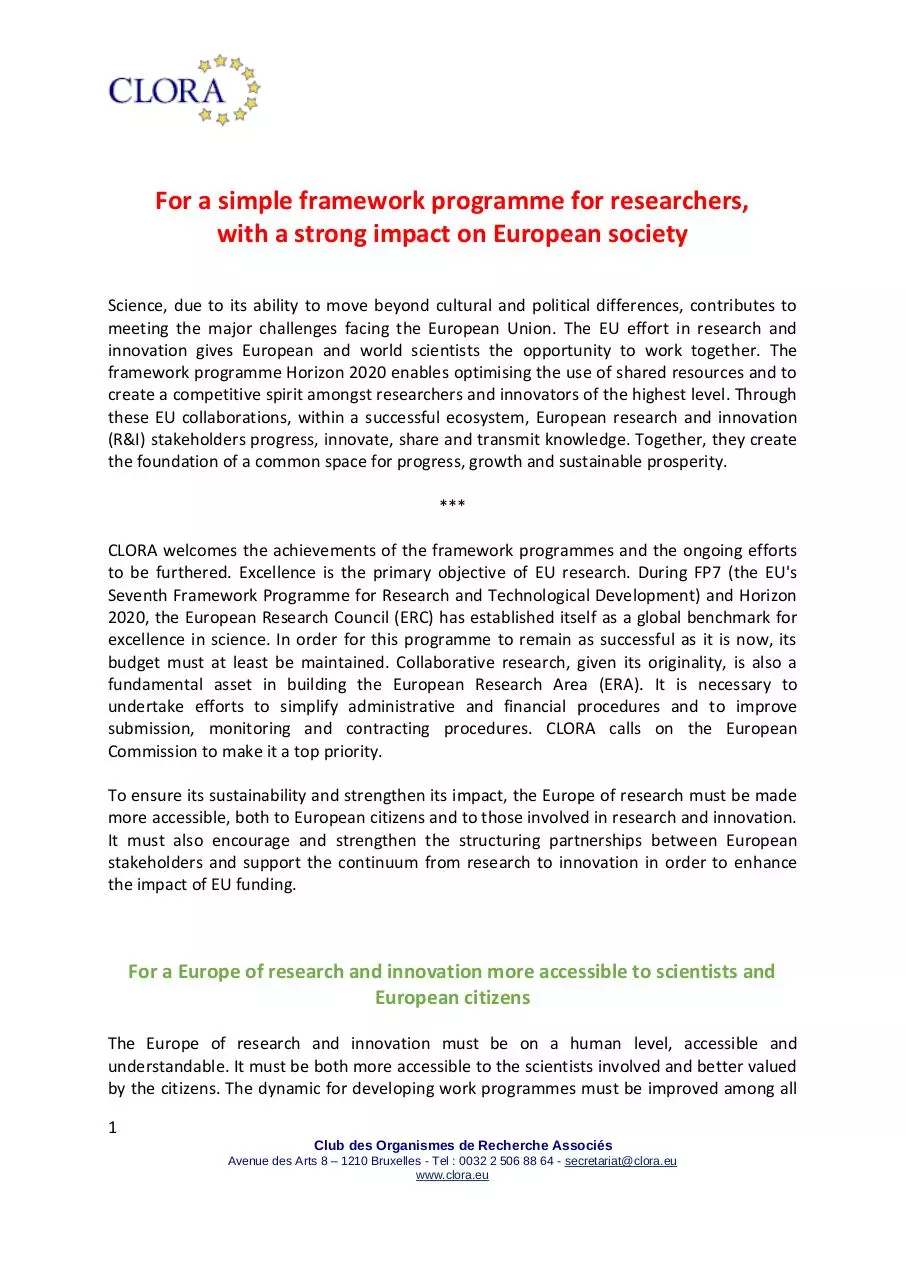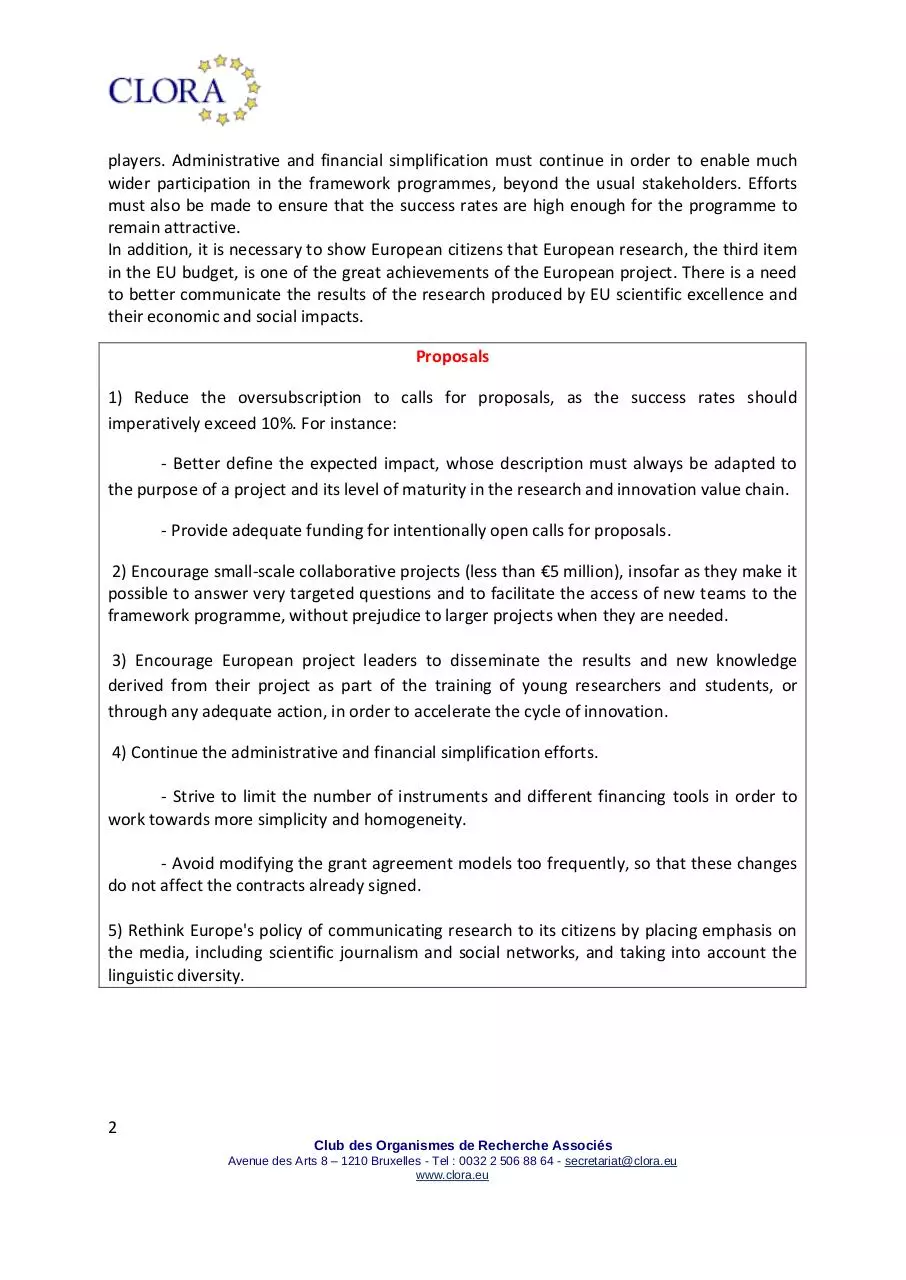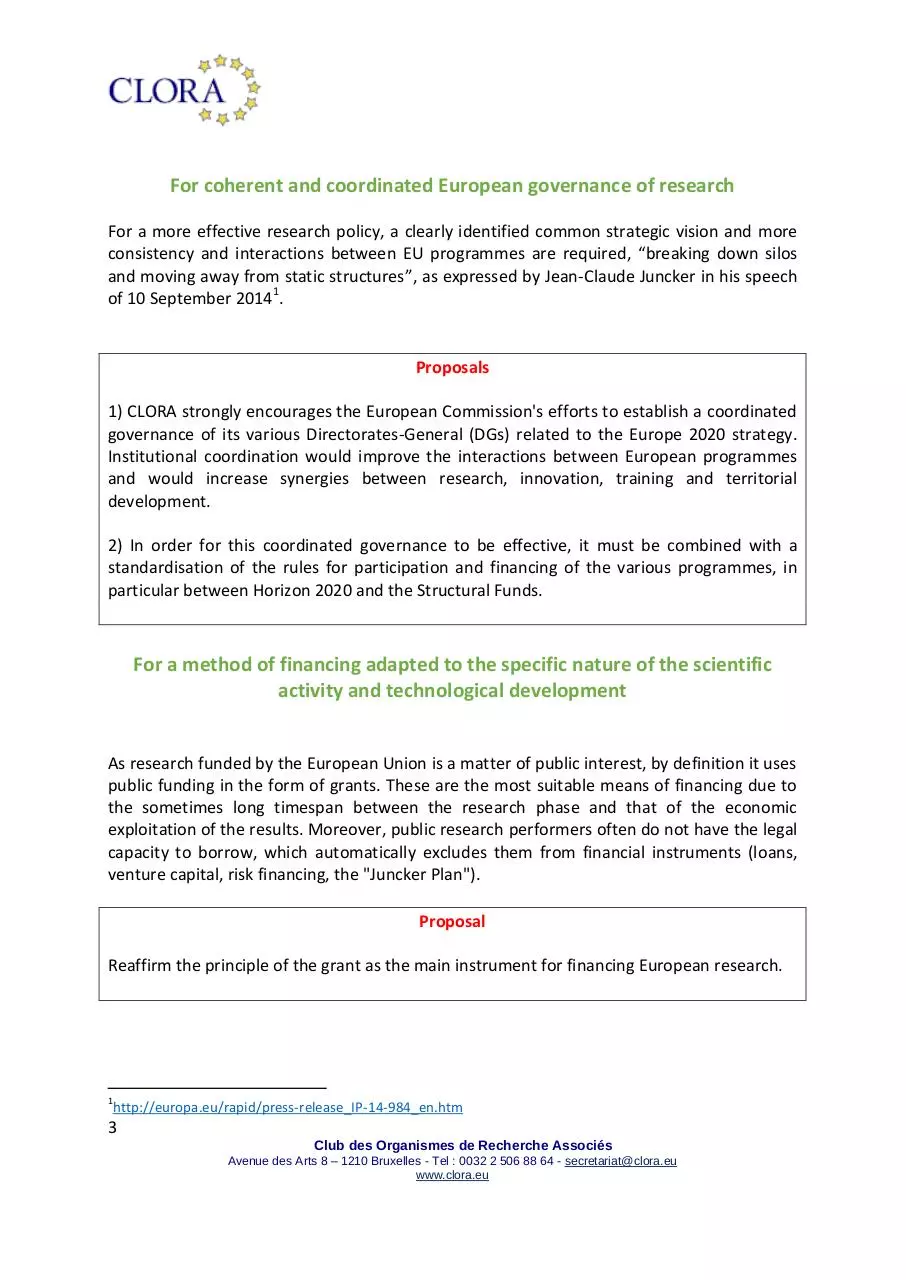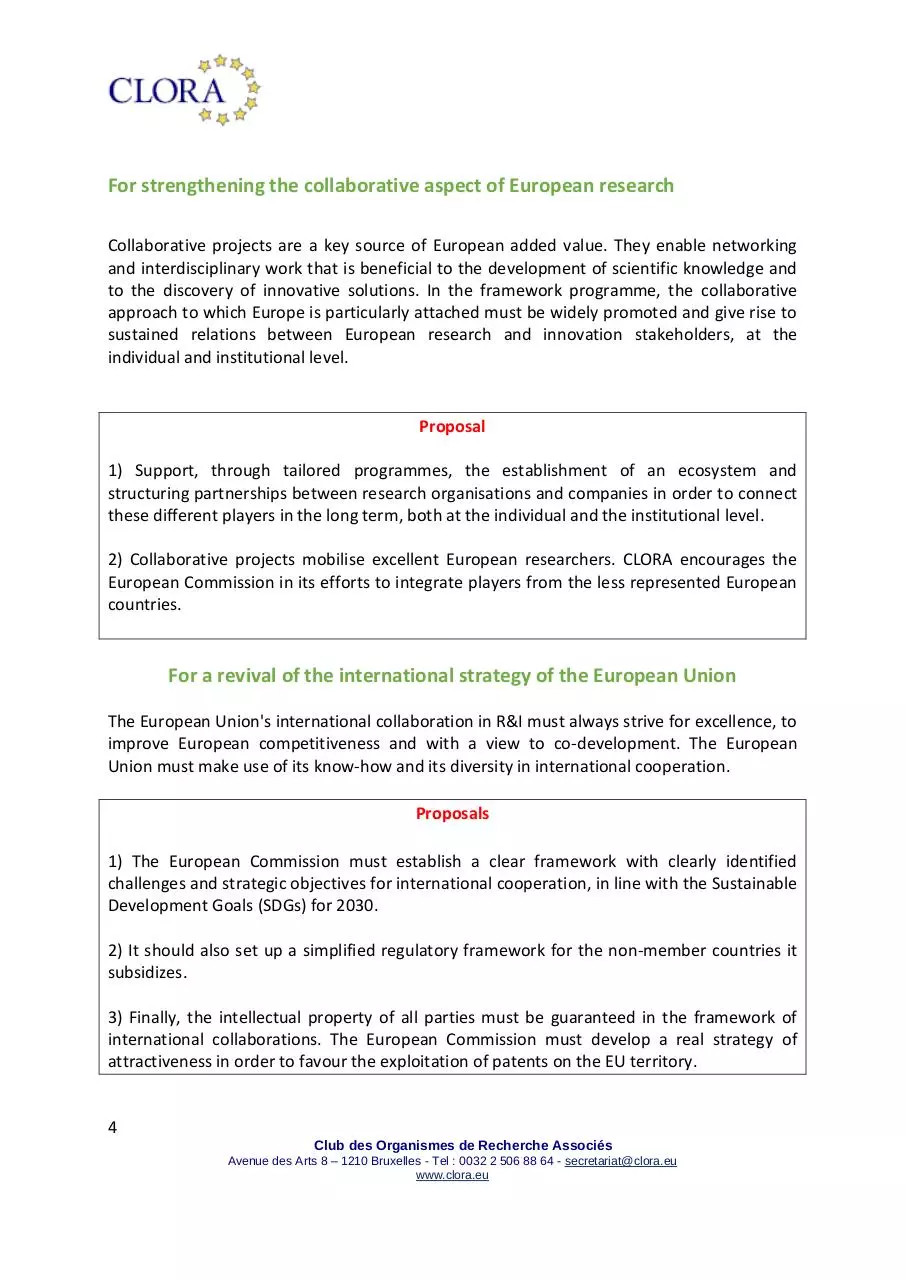Position paper midterm review CLORA (PDF)
File information
Author: HL TRAD
This PDF 1.5 document has been generated by Microsoft® Word 2010, and has been sent on pdf-archive.com on 10/01/2017 at 15:17, from IP address 91.183.x.x.
The current document download page has been viewed 2690 times.
File size: 374.71 KB (6 pages).
Privacy: public file





File preview
For a simple framework programme for researchers,
with a strong impact on European society
Science, due to its ability to move beyond cultural and political differences, contributes to
meeting the major challenges facing the European Union. The EU effort in research and
innovation gives European and world scientists the opportunity to work together. The
framework programme Horizon 2020 enables optimising the use of shared resources and to
create a competitive spirit amongst researchers and innovators of the highest level. Through
these EU collaborations, within a successful ecosystem, European research and innovation
(R&I) stakeholders progress, innovate, share and transmit knowledge. Together, they create
the foundation of a common space for progress, growth and sustainable prosperity.
***
CLORA welcomes the achievements of the framework programmes and the ongoing efforts
to be furthered. Excellence is the primary objective of EU research. During FP7 (the EU's
Seventh Framework Programme for Research and Technological Development) and Horizon
2020, the European Research Council (ERC) has established itself as a global benchmark for
excellence in science. In order for this programme to remain as successful as it is now, its
budget must at least be maintained. Collaborative research, given its originality, is also a
fundamental asset in building the European Research Area (ERA). It is necessary to
undertake efforts to simplify administrative and financial procedures and to improve
submission, monitoring and contracting procedures. CLORA calls on the European
Commission to make it a top priority.
To ensure its sustainability and strengthen its impact, the Europe of research must be made
more accessible, both to European citizens and to those involved in research and innovation.
It must also encourage and strengthen the structuring partnerships between European
stakeholders and support the continuum from research to innovation in order to enhance
the impact of EU funding.
For a Europe of research and innovation more accessible to scientists and
European citizens
The Europe of research and innovation must be on a human level, accessible and
understandable. It must be both more accessible to the scientists involved and better valued
by the citizens. The dynamic for developing work programmes must be improved among all
1
Club des Organismes de Recherche Associés
Avenue des Arts 8 – 1210 Bruxelles - Tel : 0032 2 506 88 64 - secretariat@clora.eu
www.clora.eu
players. Administrative and financial simplification must continue in order to enable much
wider participation in the framework programmes, beyond the usual stakeholders. Efforts
must also be made to ensure that the success rates are high enough for the programme to
remain attractive.
In addition, it is necessary to show European citizens that European research, the third item
in the EU budget, is one of the great achievements of the European project. There is a need
to better communicate the results of the research produced by EU scientific excellence and
their economic and social impacts.
Proposals
1) Reduce the oversubscription to calls for proposals, as the success rates should
imperatively exceed 10%. For instance:
- Better define the expected impact, whose description must always be adapted to
the purpose of a project and its level of maturity in the research and innovation value chain.
- Provide adequate funding for intentionally open calls for proposals.
2) Encourage small-scale collaborative projects (less than €5 million), insofar as they make it
possible to answer very targeted questions and to facilitate the access of new teams to the
framework programme, without prejudice to larger projects when they are needed.
3) Encourage European project leaders to disseminate the results and new knowledge
derived from their project as part of the training of young researchers and students, or
through any adequate action, in order to accelerate the cycle of innovation.
4) Continue the administrative and financial simplification efforts.
- Strive to limit the number of instruments and different financing tools in order to
work towards more simplicity and homogeneity.
- Avoid modifying the grant agreement models too frequently, so that these changes
do not affect the contracts already signed.
5) Rethink Europe's policy of communicating research to its citizens by placing emphasis on
the media, including scientific journalism and social networks, and taking into account the
linguistic diversity.
2
Club des Organismes de Recherche Associés
Avenue des Arts 8 – 1210 Bruxelles - Tel : 0032 2 506 88 64 - secretariat@clora.eu
www.clora.eu
For coherent and coordinated European governance of research
For a more effective research policy, a clearly identified common strategic vision and more
consistency and interactions between EU programmes are required, “breaking down silos
and moving away from static structures”, as expressed by Jean-Claude Juncker in his speech
of 10 September 20141.
Proposals
1) CLORA strongly encourages the European Commission's efforts to establish a coordinated
governance of its various Directorates-General (DGs) related to the Europe 2020 strategy.
Institutional coordination would improve the interactions between European programmes
and would increase synergies between research, innovation, training and territorial
development.
2) In order for this coordinated governance to be effective, it must be combined with a
standardisation of the rules for participation and financing of the various programmes, in
particular between Horizon 2020 and the Structural Funds.
For a method of financing adapted to the specific nature of the scientific
activity and technological development
As research funded by the European Union is a matter of public interest, by definition it uses
public funding in the form of grants. These are the most suitable means of financing due to
the sometimes long timespan between the research phase and that of the economic
exploitation of the results. Moreover, public research performers often do not have the legal
capacity to borrow, which automatically excludes them from financial instruments (loans,
venture capital, risk financing, the "Juncker Plan").
Proposal
Reaffirm the principle of the grant as the main instrument for financing European research.
1
http://europa.eu/rapid/press-release_IP-14-984_en.htm
3
Club des Organismes de Recherche Associés
Avenue des Arts 8 – 1210 Bruxelles - Tel : 0032 2 506 88 64 - secretariat@clora.eu
www.clora.eu
For strengthening the collaborative aspect of European research
Collaborative projects are a key source of European added value. They enable networking
and interdisciplinary work that is beneficial to the development of scientific knowledge and
to the discovery of innovative solutions. In the framework programme, the collaborative
approach to which Europe is particularly attached must be widely promoted and give rise to
sustained relations between European research and innovation stakeholders, at the
individual and institutional level.
Proposal
1) Support, through tailored programmes, the establishment of an ecosystem and
structuring partnerships between research organisations and companies in order to connect
these different players in the long term, both at the individual and the institutional level.
2) Collaborative projects mobilise excellent European researchers. CLORA encourages the
European Commission in its efforts to integrate players from the less represented European
countries.
For a revival of the international strategy of the European Union
The European Union's international collaboration in R&I must always strive for excellence, to
improve European competitiveness and with a view to co-development. The European
Union must make use of its know-how and its diversity in international cooperation.
Proposals
1) The European Commission must establish a clear framework with clearly identified
challenges and strategic objectives for international cooperation, in line with the Sustainable
Development Goals (SDGs) for 2030.
2) It should also set up a simplified regulatory framework for the non-member countries it
subsidizes.
3) Finally, the intellectual property of all parties must be guaranteed in the framework of
international collaborations. The European Commission must develop a real strategy of
attractiveness in order to favour the exploitation of patents on the EU territory.
4
Club des Organismes de Recherche Associés
Avenue des Arts 8 – 1210 Bruxelles - Tel : 0032 2 506 88 64 - secretariat@clora.eu
www.clora.eu
For a high-impact European science that creates economic and social value
The benefits of science permeate all areas of society. It is necessary to contribute to realising
this potential by facilitating the transition from research to application. The entire value
chain of research to innovation must be funded in order to ensure a continuum. The societal
challenges of Horizon 2020 enable a real cross-sectoral multidisciplinarity, source of
scientific progress and innovation. The structuring of pillar 3 by challenges, responding to the
priority issues for European society, must be maintained.
Proposals
1) Rebalance the funding for the different stages of maturation of discoveries, technologies
and solutions in the innovation process ranging from basic research to application. This
implies:
- including more upstream research in pillars two and three,
- streamlining technology transfer instruments.
2) Better co-ordinate the programming of Societal Challenges to take account of their
transversality.
3) Strengthen the capabilities of Challenge 6 (Innovative, Inclusive and Reflective Societies)
to anticipate and deliver sustainable responses to the current European crises. This
challenge must also contribute to building a vision for the European project.
5
Club des Organismes de Recherche Associés
Avenue des Arts 8 – 1210 Bruxelles - Tel : 0032 2 506 88 64 - secretariat@clora.eu
www.clora.eu
Conclusion
In order to support the potential and scientific quality of those involved in research and
innovation, which guarantees Europe's economic and social progress, CLORA recommends
that:
- scientific excellence remain an indispensable prerequisite for obtaining funding through the
European framework programmes
- the framework programme be accessible and simplified, freeing up time for actual research
and innovation;
- EU policies on training, research and innovation be more coherent and integrated;
- grants be maintained as the main funding tool for research and innovation;
- the collaborative uniqueness of European research be reaffirmed, favouring the setting up
and strengthening of structuring partnerships between research and innovation
stakeholders.
- Europe has a real international strategy for research;
Scientific expertise is necessary for political decision-making. The "three-way dialogue"
between science, politics and citizens is of fundamental importance, and CLORA wishes to
participate in this effort of mutual understanding for the benefit of growth, development
and employment in Europe.
***
CLORA : French Club of associated research organizations
Set up in 1991 in Brussels to strengthen the relationship between its members and the European Union, CLORA
aims to enhance the participation of its members to EU programs involving research, technology, innovation,
training and education.
With its 33 members, CLORA gathers most of the French public research centers and universities encompassing
a plethora of scientific fields. In numbers, the CLORA represents:
- 163 400 staff, including more than 100 000 researchers
- Close to 2000 Horizon 2020 projects, as participants and coordinators.
The goal of the CLORA is to contribute to the ERA’s scientific excellence and to foster impactful innovation, for
European competitiveness and the European society at large. Ten CLORA members are represented in Brussels
:
6
Club des Organismes de Recherche Associés
Avenue des Arts 8 – 1210 Bruxelles - Tel : 0032 2 506 88 64 - secretariat@clora.eu
www.clora.eu
Download Position paper midterm review - CLORA
Position paper midterm review - CLORA.pdf (PDF, 374.71 KB)
Download PDF
Share this file on social networks
Link to this page
Permanent link
Use the permanent link to the download page to share your document on Facebook, Twitter, LinkedIn, or directly with a contact by e-Mail, Messenger, Whatsapp, Line..
Short link
Use the short link to share your document on Twitter or by text message (SMS)
HTML Code
Copy the following HTML code to share your document on a Website or Blog
QR Code to this page

This file has been shared publicly by a user of PDF Archive.
Document ID: 0000534524.